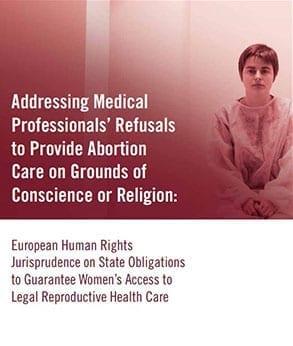Polish Government Has a Momentous Opportunity to End Reproductive Rights Violations and Protect Women’s Health During Pregnancy
Decision-makers must take urgent steps to repeal the near total ban on abortion.
(GENEVA, 12.14.2023) – Today the Center for Reproductive Rights called for urgent action by Poland’s newly appointed government to protect women’s health and rights during pregnancy and to repeal the near total ban on abortion that has caused the deaths of some women and harmed the health and wellbeing of thousands more.
Poland’s new Prime Minister has pledged to take action to repeal the ban and legalize abortion so that women in Poland can safely make personal decisions about their pregnancies.
“The time is now to prioritize the lives and wellbeing of women in Poland and bring an end to the serious human rights violations they have endured as a result of the restrictive law on abortion. Poland’s obligations under international human rights law are clear. The government must move now to decriminalize abortion and put in place effective measures to guarantee that abortion care is accessible in practice for all women in Poland,” said Leah Hoctor, Senior Director for Europe at the Center for Reproductive Rights. “While law reform is ongoing, an immediate moratorium on all criminal investigations and prosecutions related to the law on abortion must be adopted, and harassment of women and all those who support them must cease.”
In a new judgement issued today, the European Court of Human Rights held that rollbacks on legal entitlements to abortion in Poland that took effect in 2021 following a 2020 ruling of the illegitimate Constitutional Tribunal violated a woman’s right to respect for private life under the European Convention on Human Rights. The European Court ruled that because she was denied access to abortion in Poland following the 2021 rollbacks her rights were violated, and it ordered Poland to provide compensation to the woman.
###
MEDIA CONTACT: [email protected]
Background
Poland has one of Europe’s most restrictive abortion laws. It is one of only two European Union Member States that has not legalized abortion on request or broad social grounds. Instead, the law allows abortion only in situations of risk to the life or health of a pregnant woman, or if a pregnancy results from rape. Even for those eligible for a legal abortion it is almost impossible to obtain one in practice. Every year thousands of women are forced to seek extra-legal abortion in Poland by importing medication for abortion or leaving Poland to access abortion care in other European countries. This subjects them to harm and suffering and places their health and wellbeing at risk. In recent years a number of women have died in Polish hospitals because they were not provided with life-saving abortion care during miscarriages. Research indicates that the ban on abortion is also having a very harmful impact on refugees from the war in Ukraine who have sought refuge in Poland and need abortion care.
The European Court of Human Rights has issued several judgements against Poland because of its failures to guarantee access to abortion care in practice. Poland has still not complied with these judgements.
In its newest judgement, issued today in the case of M.L. v. Poland, the European Court found that a woman’s rights were violated by Polish abortion laws. The applicant was represented by lawyers associated with the Foundation for Women and Family Planning in Poland (FEDERA). The European Court ruled that the regressive restrictions on abortion introduced into Polish law in 2021 interfered with the applicant’s right to private life, including personal autonomy and physical and psychological integrity. M.L. was pregnant when the law changed and had been entitled to an abortion under the previous law, with an abortion procedure scheduled to take place in January 2021. However, following the change in the law her appointment was cancelled and she was left with no choice but to travel to a foreign country to obtain legal abortion care. The European Court found that her personal autonomy and integrity had been unlawfully restricted by Poland, because the manner in which the abortion law was changed was unlawful and unforeseeable. The Court held that the composition of the Constitutional Tribunal that issued the regressive ruling which led to the restriction on entitlements involved judges appointed by a severely irregular procedure that did not meet rule of law requirements.

